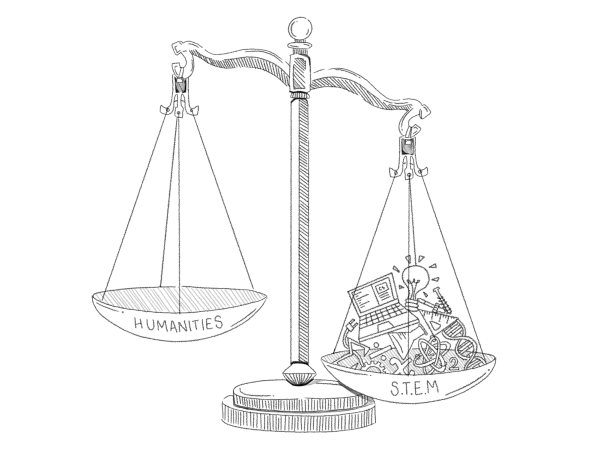The Reality Of Time Accommodations At Menlo
According to Academic Coordinator Lily Lam, 15% of the student body has learning accommodations. Staff image: Louisa Sonsini.
June 7, 2021
According to Academic Coordinator Lily Lam, 15% of the student body has learning accommodations. Yet, throughout my five years as a Menlo student with a learning accommodation, I’ve realized that the Menlo community extremely overlooks them. In my experience, Menlo students are unaware of what the academic experience is like for students with learning difficulties and how the school accommodates students with these academic disparities.
Menlo offers a Student Success Plan (SSP), also known as a 504 Plan, which offers learning accommodations or modifications to the school’s general curriculum to aid any student who struggles with a diagnosed learning difficulty. These accommodations include permitted use of a calculator, a special app or device or extra time on tests.
When I was in fifth grade, I was diagnosed with Attention Deficit Hyperactivity Disorder (ADHD). According to the Centers for Disease Control and Prevention (CDC), ADHD creates problems such as difficulty focusing, hyperactivity and impulsiveness. Four months later, my mom signed me up for a lengthy cognitive evaluation to see if I was eligible for an SSP. After careful analysis of my application, I was provided with double time accommodations on tests and assessments at Menlo.
Personally, I have always preferred to keep my ADHD private. Towards the beginning of my diagnosis, it was difficult for me to adjust to a system that publicizes accommodations. For example, when I was in eighth grade, I had a teacher who would publically announce how much more time I had than the rest of my class and seat me in the back whenever we had a test, isolating me. I could feel students’ eyes on me constantly, and I heard whispers of people claiming how my accommodations were unfair or wondering what was wrong with me. As a result, I began to dread taking tests in class because I felt insecure. I would also feel awkward when my friends asked why I would stay so late after school. I was embarrassed to tell them I had extra time for a test.
For the past five years at Menlo, I have noticed a stigma around students with extra time. People have spread rumors or asked blunt questions like, “Do you get extra time just because you kiss up to the teachers?” I felt judged when people saw me after school completing a test. I felt as if they were wondering what was wrong with me. In middle school, a few classmates even approached me about having an unfair advantage on tests, and they credited my academic success to my time accommodations, discrediting me and my achievements. These rumors, however, are untrue. SSP’s are provided by learning specialists to students with diagnosed learning difficulties, and they are meant to counteract any of their cognitive struggles in order to level the academic playing field. According to the Student Support Services Project, the SSP process is extremely strict, and a team of specialized psychologists survey applicants and determine whether a learning difficulty is present and whether an SSP is necessary. “Even the College Board acts as a third party observer to ensure that each given accommodation is absolutely necessary,” Lam said.
During my time at Menlo, I have greatly appreciated the well-trained staff, specifically hired to assist kids with academic differences, such as Lam. “[I] specialize in supporting students who struggle in classes, or who have learning differences,” Lam said. Personally, Lam has assisted me in planning extra time with my teachers and communicating with my parents and advocating about my accommodations. She has been a huge help because I found myself struggling with time management in a lot of classes, and she helped me communicate with my teachers and create a work schedule.
I have faced many obstacles in school due to my ADHD. For years, I have always felt an impending sense of guilt because I felt unproductive, unorganized or lazy compared to my classmates, but realistically, I can’t compare. I have a learning difficulty that causes me to procrastinate constantly, lack motivation, and make it difficult for me to focus for long periods of time. However, I was eventually able to realize these comparisons were useless and only detrimental to my success. I should be proud that I have been able to achieve good grades despite facing academic obstacles.
One obstacle of extra time accommodations is the complex process of organizing extra time with teachers because the process tends to be subjective and varies depending on teacher preference. In my experience, some teachers will reach out to students to schedule time the night before, while others expect students to reach out with plenty of advanced notice. In my experience, it is crucial to determine the amount of planning time I will need to arrange time accommodations before taking a test. Generally, teachers will split up the test into two parts to ensure academic equity. This year, I had an incident with a teacher where I emailed her two days prior to a test, and she didn’t get back to me until the night before. It was stressful because I was very unsure of when I was supposed to take the exam. It turned out that the only time arrangement my teacher had available for me was an hour before school started, which was difficult because my parents weren’t always able to take me earlier. Planning during the pandemic was especially frustrating for me because I couldn’t meet with teachers in person, so I had to plan and organize time completely over email.
Last year, I had a teacher who preferred that I told him what times I was available to take the second part of my test at least 24 hours before the exam, but because of my ADHD, this was often difficult to remember. The night before one of our exams, I suddenly remembered that I had to schedule my extra time. But when I emailed my teacher, he never answered. When I approached him later at school, he denied me my extra time because I hadn’t given him enough notice. As a result, I had to take the test at the same pace as the rest of the class. This was extremely stressful because I had to rush and answer the questions in half my usual time which caused me to miss many of the questions and not accurately display my full knowledge. Although I understood I was late to email him with enough notice, this incident was not only a violation of my SSP, but it also proved how necessary my learning accommodations are for me to do my best work.
Although having double time to complete assessments is convenient, it is also overwhelming and time-consuming especially during stressful weeks such as finals week. According to sophomore Emma Borders, who also receives double time accommodations, finals are mentally exhausting. “This week, I have a math final designed to take two hours, meaning that it is four hours for me, which is very stressful,” Borders said.
I had two four-hour finals over the span of two days. This experience was incredibly draining for me, and by the end of the tests, I was exhausted and almost ready to give up. Personally, I think that finals would feel more approachable if students with extra time, such as myself, were given a break in-between sections. Even though extra time helps me, it’s equally important for me to take breaks and refresh my mind, especially considering that my ADHD makes it hard to stay focused on a subject for such a lengthy period of time.
In order to destigmatize learning accommodations at Menlo, it is important to educate the community on why these accommodations don’t provide students with an advantage, but rather level the playing field. Maintaining academic equity is extremely important and is what makes gaining extra time such a lengthy, difficult process altogether.












